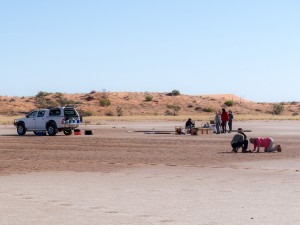Environmental cost of fieldwork
 Students and teachers alike are concerned for the environment, but the environmental cost of fieldwork is a seldom discussed and uncomfortable irony. Following a rare discussion on the subject with colleagues during a research field trip I decided to investigate to see if we can make more informed choices when planning and running field trips.
Students and teachers alike are concerned for the environment, but the environmental cost of fieldwork is a seldom discussed and uncomfortable irony. Following a rare discussion on the subject with colleagues during a research field trip I decided to investigate to see if we can make more informed choices when planning and running field trips.
There is no policy to evaluate the environmental impact of field trips, but HEFCE do collect data on business travel and require universities to have strategies for reducing emissions (Le Quéré et al 2015). As teachers we have the power and responsibility to control quality of learning and environmental impact to some extent. A recent Nature editorial (Nature News 2015) outlined the environmental impact of research, based on the findings of a working paper from the Tyndall Centre for Climate Change Research (Le Quéré et al 2015). These sources clearly demonstrate that academics exceed their fair share of carbon emissions compared to the general population, and that this undermines the credibility of scientists who believe we need to curb carbon emissions. Although written from the research perspective, these articles provide relevant and useful information that can inform best practice in teaching. Le Quéré et al (2015) suggest that monitoring travel emissions is a good first step towards reducing research related emissions:
One of the most important steps before setting a roadmap to reduce emissions from research-driven travelling is to be able to measure, track and justify these emissions
Their proposal includes a simple equation multiplying the travel emissions by a justification weighting (low number is better justified). They rank fieldwork as a well justified activity, and they apply different weights depending upon career stage. This scheme could be extended to track teaching and learning activities specifically by adding key educational activities and “student” in the career stage section.
Alternatively, as we are already assessing learning, we could make an education specific scoring scheme by using a learning metric instead of the research justification weighting used by Le Quéré et al (2015):
learning impact = (Emissions * hours travelling) / Learning metric
Emissions is a transportation mode specific CO2 emission factor (for instance it is higher for air travel compared to taking a train)
The above scheme could be used as a starting point to minimising the environmental impact of learning, and it could be calculated per lesson or over longer time periods like an academic year. It could be calculated per student or to cover a group such as a class or year group, in which case it could inform curriculum planning. The aim would be to minimise the learning impact score by either reducing emissions, increasing learning, or preferably both. It would be informative to compare the learning impact of local day trips with extended field trips in distant places. A major obstacle to doing this is the selection of a suitable learning metric that captures the intangible learning opportunities of fieldwork, that in general are not meaningfully assessed.
I plan to begin monitoring travel emissions as recommended by Le Quéré et al (2015) – ultimately to identify whether any teaching emissions are poorly justified. Less justified activities should be targeted to increase their learning value or decrease the associated emission, which could be done in a number of ways. Alternative delivery schemes like online/blended learning could reduce emissions but they might also impact learning. Similarly bringing fieldwork closer to the students, and especially avoiding air travel would reduce emissions, but this might also impact learning and affect recruitment. Therefore any strategy to reduce teaching related carbon emissions must be considered carefully and holistically.
References
Le Quéré C, Capstick S, Corner A, Cutting D, Johnson M, Minns A, Schroeder H, Walker-Springett K, Whitmarsh L, Wood R (2015). Towards a culture of low-carbon research for the 21st Century. Tyndall Working Paper 161.
Nature News (2015). A clean, green science machine (Editorial). Nature 519: 261.